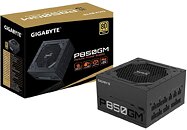- Joined
- Oct 9, 2007
- Messages
- 47,670 (7.43/day)
- Location
- Dublin, Ireland
| System Name | RBMK-1000 |
|---|---|
| Processor | AMD Ryzen 7 5700G |
| Motherboard | Gigabyte B550 AORUS Elite V2 |
| Cooling | DeepCool Gammax L240 V2 |
| Memory | 2x 16GB DDR4-3200 |
| Video Card(s) | Galax RTX 4070 Ti EX |
| Storage | Samsung 990 1TB |
| Display(s) | BenQ 1440p 60 Hz 27-inch |
| Case | Corsair Carbide 100R |
| Audio Device(s) | ASUS SupremeFX S1220A |
| Power Supply | Cooler Master MWE Gold 650W |
| Mouse | ASUS ROG Strix Impact |
| Keyboard | Gamdias Hermes E2 |
| Software | Windows 11 Pro |
GIGABYTE is aware of certain media outfits casting doubt over the quality of Power Supply models GP-P850GM and GP-P750GM. GIGABYTE takes pride in the design and quality of our products and as such, takes reports of this manner extremely seriously and therefore would like to address the reported potential issues as follows:
For desktop PC systems, there can occasionally be instances where the peak wattage can exceed the intended usage range. During such instances, the GIGABYTE GP-P850GM / GP-P750GM model power supplies include the industry standard built-in safety feature "Over Power Protection" (OPP). The OPP safety feature is designed to shut down the unit when the power load exceeds the wattage the unit was designed to operate within. The OPP was set to 120% to 150%, 1020 W~1300 W for GP-P850GM, and 900 W~1125 W for the GP-P750GM.

GIGABYTE, appreciates and takes into consideration any feedback and suggestions from our media partners and PC hardware professionals. We were made aware by third parties of concerns regarding potential issues of the GP-P850GM and GP-P750GM tripping at high wattages when tested via DC Electronic Load equipment for extended lengths of time repeatedly close to the 120% to 150% OPP trigger point. This level of extended testing could severely reduce the lifespan of the product and components of the GP-P850GM and GP-P750GM.
To address these potential issues raised by third parties, specifically, those discovered during their testing via DC Electronic Load equipment for extended lengths of time repeatedly close to the 120% to 150% OPP trigger point. GIGABYTE has made adjustments and lowered the OPP on GP-P850GM and GP-P750GM to the below values.
GIGABYTE GP-P850GM and GP-P750GM PSU's included industry standard power protection designs OCP, OTP, OVP, OPP, UVP, and SCP.
Safety certification from various countries to ensure safe and stable operation of your system.
To offer customers complete peace of mind, any serial number not listed in Appendix 1 are the amended OPP settings as listed in point 3.
Despite the fact that both before & after OPP adjustment versions are reliable for real world usage, we still offer owners of the GP-P850GM or GP-P750GM products included in the serial number range listed in Appendix 1 can apply for the GP-P850GM and GP-P750GM return and exchange service.
View at TechPowerUp Main Site
For desktop PC systems, there can occasionally be instances where the peak wattage can exceed the intended usage range. During such instances, the GIGABYTE GP-P850GM / GP-P750GM model power supplies include the industry standard built-in safety feature "Over Power Protection" (OPP). The OPP safety feature is designed to shut down the unit when the power load exceeds the wattage the unit was designed to operate within. The OPP was set to 120% to 150%, 1020 W~1300 W for GP-P850GM, and 900 W~1125 W for the GP-P750GM.

GIGABYTE, appreciates and takes into consideration any feedback and suggestions from our media partners and PC hardware professionals. We were made aware by third parties of concerns regarding potential issues of the GP-P850GM and GP-P750GM tripping at high wattages when tested via DC Electronic Load equipment for extended lengths of time repeatedly close to the 120% to 150% OPP trigger point. This level of extended testing could severely reduce the lifespan of the product and components of the GP-P850GM and GP-P750GM.
To address these potential issues raised by third parties, specifically, those discovered during their testing via DC Electronic Load equipment for extended lengths of time repeatedly close to the 120% to 150% OPP trigger point. GIGABYTE has made adjustments and lowered the OPP on GP-P850GM and GP-P750GM to the below values.
- GP-P850GM- Adjusted OPP trigger point range from 120% ~ 150% to 110% ~ 120%
- Before: 1020 W ~ 1300 W
- After: 950 W ~ 1050 W
- GP-P750GM- Adjusted OPP trigger point range from 120% ~ 150% to 110% ~ 120%
- Before: 900 W ~ 1125 W
- After: 825 W ~ 925 W
GIGABYTE GP-P850GM and GP-P750GM PSU's included industry standard power protection designs OCP, OTP, OVP, OPP, UVP, and SCP.
Safety certification from various countries to ensure safe and stable operation of your system.
To offer customers complete peace of mind, any serial number not listed in Appendix 1 are the amended OPP settings as listed in point 3.
Despite the fact that both before & after OPP adjustment versions are reliable for real world usage, we still offer owners of the GP-P850GM or GP-P750GM products included in the serial number range listed in Appendix 1 can apply for the GP-P850GM and GP-P750GM return and exchange service.
- Model name:GP-P850GM: S/N From SN20343G031011 to SN20513G022635
- Model name:GP-P750GM; S/N From SN20243G001301 to SN20453G025430
View at TechPowerUp Main Site






